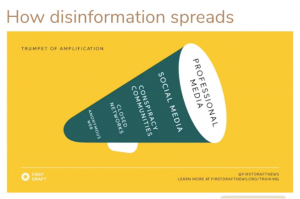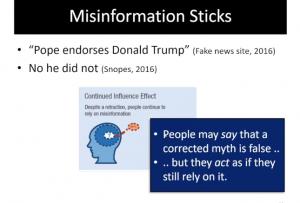The need for effective science communication tools and approaches has never been greater than during the COVID-19 pandemic. While policymakers use evidence to guide decisions, ineffective communication or an abundance of misinformation can undermine public trust and hinder support of science-based policy.
The 12th annual Canadian Science Policy Conference (CSPC) took place in a virtual format this year, providing an exceptionally rich program to address the contemporary challenges of communicating science during a global health crisis. CSPC brought together scientific experts, politicians, journalists, students and other academic and industry professionals to connect and strengthen Canada’s science and innovation policy community. The conference was organized by the Canadian Science Policy Centre, a non-partisan and not-for-profit organization, and its more than 60 volunteers nationwide.
This year’s conference, held between November 16 and 20, had the theme “New Decade, New Realities: Hindsight, Insight, Foresight.” CSPC hosted more than 90 panel sessions with 450 Canadian and international speakers, making it one of the largest national forums for members of the science policy community.
I had the opportunity to attend and immerse myself in a plethora of plenaries and sessions held via video conferencing. Topics included health care, economic development, engineering biology, international affairs and much more. The digital platform also provided participants with a virtual networking lounge and a 3D exhibit hall to interact online.
In a symposium titled, “Science Communication 2020: Tools and Approaches for an Era of Uncertainty,” science communications experts on three panels aimed to equip participants with concepts and tools to create a solution-oriented toolkit to promote effective communication during this challenging time; recognize and respond to misinformation and disinformation; and strengthen engagement between the public and scientists on polarizing scientific issues.
The first session focused on the role of science communications and how it’s the most important public health tool available. Panel speaker Dr. Bonnie Henry, Provincial Health Officer for British Columbia, spoke about some of the practical aspects of communication in response to COVID-19 and other scientific crises.
She emphasized that explaining complex science concepts in a way that people understand will avoid misinformation filling in the gap. She stated that acknowledging the unknowns about the virus and being upfront and honest with the public will help alleviate the fears and anxieties people face, giving them hope that we will move through this crisis together.
The other response public health officials have in a crisis is altruism: the selfless concern for the well-being of others. Dr. Henry noted that aligning information and a call to action – giving people a tangible task – fosters the feeling of altruism and togetherness in order to prevent trauma in our communities. Language also matters. Saying “our pandemic” or “here’s what we are going to do,” can help drive an altruistic response and promote inclusiveness.
The second panel session focused on limiting the impact of disinformation and misinformation – the intentional and unintentional spread of misleading and false information – that hinders communication efforts and creates obstacles for buy-in from public and science-based policy decisions. The COVID-19 “infodemic” is an example of how false information has spread online through social media channels.
Professor Stephan Lewandowsky, Chair of Cognitive Psychology at the University of Bristol, presented on the societal impact of misinformation and why people cling to it. Andrea Bellemare, a reporter and producer at CBC News, explained how misinformation spreads based on an emotional response through closed or private online communities such as Facebook groups, pages and Instagram accounts that you have to request to follow. She also addressed the spread of disinformation using the “trumpet of amplification” concept shared by First Draft News. Kimberly Girling, interim executive director at Evidence for Democracy, also shared the following tips for how to combat misinformation on the web.
Take responsibility for the information you share online:
- Look for the original story
- Check for credible sources such as the author or a legitimate source
- See if the information has been replicated or shared elsewhere
- Fact check and search for words like “hoax,” “scam” and “fake”
- If you feel emotionally charged about a post, take a pause before commenting or sharing
What to do if you’ve shared misinformation:
- Delete the post from the social media platform
- Don’t add a comment to correct the post
- Warn your followers of potentially false information and post a link to accurate sources
Correct misinformation when you see it:
- Challenge the information, not the person who posted it
- Keep the broader audience in mind
- Prepare people for potential misinformation before they are exposed to it
Alan Nursall, President and CEO of TELUS World of Science in Edmonton, moderated the final session of the symposium that highlighted new practices for stronger public engagement. A group of panelists engaged in a conversation about the nature of polarized communication, how different science communication tools can be utilized to decrease polarization and what can be done to improve communication effectiveness.
In the end, the insightful dialogue and experiences shared by experts demonstrated that science communication and policy is becoming more resilient in challenging circumstances. The take home message: science communications is a valuable tool that encourages science literacy and guides evidence-based decision-making, on a personal and governmental level.
Eleni Kanavas
Latest posts by Eleni Kanavas (see all)
- Science communication and policy in a year of uncertainty - December 16, 2020
- Exploring science education through art - August 13, 2020








Comments